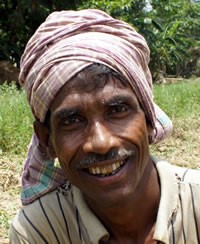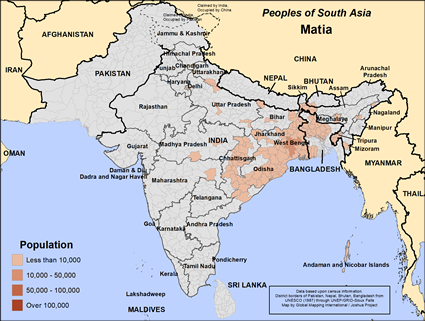Matia in India

Photo Source:
Copyrighted © 2026
Isudas All rights reserved. Used with permission |

Map Source:
People Group data: Omid. Map geography: UNESCO / GMI. Map Design: Joshua Project.
|
| People Name: | Matia |
| Country: | India |
| 10/40 Window: | Yes |
| Population: | 213,000 |
| World Population: | 241,000 |
| Primary Language: | Bengali |
| Primary Religion: | Hinduism |
| Christian Adherents: | 0.05 % |
| Evangelicals: | 0.00 % |
| Scripture: | Complete Bible |
| Ministry Resources: | Yes |
| Jesus Film: | Yes |
| Audio Recordings: | Yes |
| People Cluster: | South Asia Hindu - other |
| Affinity Bloc: | South Asian Peoples |
| Progress Level: |
|
Introduction / History
The Matia (or Matya) people are a tribal group who have long been farmers. They are subdivided into three sub-groups, which are divided into clans, which are further divided into lineages. They live in Bangladesh and Bhutan (a tiny group in Bhutan), as well as in India.
What Are Their Lives Like?
The lineages regulate marriage alliances. Preferred marriage partners are first cousins. Literacy rates are low.
What Are Their Beliefs?
The Matia worship the village deity Thakurani and celebrate the festivals Dhunauakhia and Dual Dei.
What Are Their Needs?
Lack of prayer and lack of workers remain as serious deficiencies to the advance of the good news about Jesus throughout South Asia.
Low literacy rates mean the gospel message needs to come primarily in oral form. Perhaps the Lord will send workers who know how to tell stories from scripture.
Prayer Points
A few of the Matia have reported themselves as Christians to the census of India. Please pray for these Christians, that they will understand the distinction between a cultural or nominal Christian and one who has entered into a saving relationship with Jesus Christ. Pray they will become real disciples of Jesus, living holy lives in the power of the Lord's Spirit. Please pray for improved literacy rates, for better medical care, and for an improved standard of living for this community. Pray especially for the youth to have better access to schools and for parents to make schooling a priority for their children.